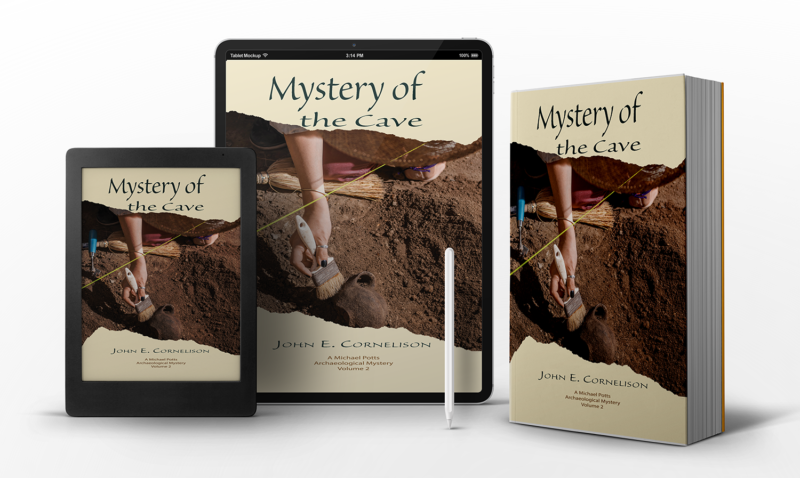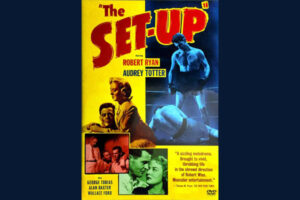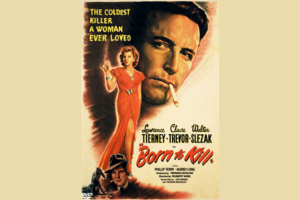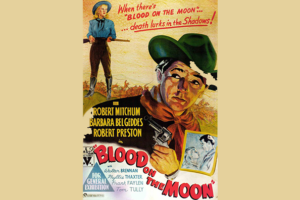
Author Joe Jordan Interview
Author Joe Jordan Interview
In this interview, I spoke with Author Joe Jordan, whose most recent book is Robert Wise: The Motion Pictures. Jordan opens up the world of director Robert Wise with detailed summaries of all of Wise’s movies as well as stories and information that put these movies in context.


Automated Transcript
JEC:
I’m here today with Joe Jordan. He just updated his book on the Director Robert Wise. And it’s fantastic. We’re going to spend some time together today talking about it. How are you today, Joe?
JEC:
Doing well, John, how are you?
JEC:
I’m doing great with the, we missed the hurricane and only lost power for a little bit today. Okay. Yeah. Let’s just jump right in. And Joe, can you tell the audience a little bit about yourself and your background?
Joe:
Certainly. Yes. I’ve been writing about the golden age of Hollywood for several years now. In addition to writing a book about Robert Wise, I’ve also written a book regarding William Castle. The famous schlock meister is most popular probably for the horror films of the late 1950s, early 1960s. And this time of the year with Halloween approaching is definitely the most popular time for William Castle. So, the book I wrote about William Castle, it covers all 56 films directed by him. At this point in time, I am currently in the process of finishing my third book. The manuscript is about 90% complete. Writing has been wonderful. I think the best part of writing is the research. You know, there’s so much to discovering my case, you know, in order to write about a particular film and multiple viewings are required. And, you know, I always discover something new about said film with each new viewing. Naturally some films are more enjoyable to watch than others. But what a treat, what a treat, this has been
JEC:
Fantastic. Are you in the, are you in California or Florida?
Joe:
I’m in Northern Cal.
JEC:
Okay. All right. Well, how did you first become interested in writing about Robert Wise? What drew you to this great director?
Joe:
So, the Robert Wise book, I should probably start off by saying that the Robert Wise book is dedicated to my father who actually passed away in July of this year. Fortunately he was able to enjoy the book, you know, upon its publication. As I was growing up, my father spoke highly of The Sand Pebbles (1966) in the day the two of us took in a screening of the film. It’s one that I’ll never forget. You know, in addition to The Sand Pebbles (1966), I was really amazed that when I viewed Robert Wise‘s filmography for the first time, he was quite versatile. He directed motion pictures of several different genres. So, as I reviewed this filmography, I knew I would very much enjoy the process of, you know, researching these films further. One thing about my book, it’s not a biography of Robert Wise, that’s the most common interpretation. You know, I just, the title pretty much says it all. Robert Wise, the motion pictures, the book offers a film by film analysis of Wise’s 40 directorial efforts. Now, of course, one will find significant biographical details when reading about Robert Wise‘s motion pictures, but it’s really not a biography. It’s more of like a film by film analysis,
JEC:
Right? That’s another thing that when I read your book, I thought, well, you know, that’s, you’re doing an expanded in depth version of what I do for my podcast. I just go over a movie and tell what happened and throw in a little facts, but not as much depth and background as you did. So I think my audience is really going to like this book because it should be right in what they’re listening to product has worked his way up. And he was successful at each step as he went through. How do you think working with Orson Welles, who was the notorious for leaving projects unfinished, for example, on The Magnificent Ambersons (1942) set Wise up for success on future projects?
Joe:
Yes. Orson Wells. What a very interesting character. You know, he was the kind of guy who had high expectations. Albeit Wise worked very hard to ensure that he would never let Orson Welles down. You know, if anybody expected to work for Mr. Wells, it was imperative that they knew their stuff, you know, they knew their craft. In the case of Robert Wise, you know, editing that’s a challenging profession. And to be an editor of citizen, Kane was Robert Wise was, you know, one of the greatest motion pictures of all time. It as not an easy task, but Robert Wise pulled it off. Nevertheless. So Wells was impressed and you know, actually hired wise to be an editor of his next picture, the one in which you speak, The Magnificent Ambersons (1942). At one point, however, during the production of The Magnificent Ambersons (1942) Wels took off for Brazil in the middle of the production.
Joe:
So Wise was actually called upon to direct part of the film and even in the process, so much experience was gained. A couple of years later, you know, Wise was asked to replace Gunther Von Fritsch as a director of 1944 as the Curse of the Cat People. Now the Curse of the Cat People, it was originally directed by Gunther Von Fritsch, but what happened was they went over budget and they fell way behind schedule. So, Gunther on fridge was dismissed and Robert Wise was brought in to basically finished what Vaughn fridge had started. He was ready for the task, I think because of the fact that Robert Wise had been groomed under, you know, Orson Wells as guidance, he was ready to take the reins of, you know, the curse of the cat people, the production of the Curse of the Cat People. And as a result, he was quite successful. You know, it is his directorial debut. Now, of course, Robert Wise didn’t see the project through from the very beginning, but I think one could consider the curse of the cat people t be his, his directorial debut, because he was able to oversee a lot of it.
JEC:
Okay. And testing, I’m just this is on the list that I sent you, but how did you get in contact with Gavin McCloud for your forward?
Joe:
So, I actually, I went through his agent. I was able to obtain contact information for his agent, sent the request and the agent got back to me and said, oh yeah, Gavin McCloud would be more than happy to have a conversation with you about Robert Wise. And so, when Mr. McCloud and I spoke over the phone for the first time, it was amazing how passionate he felt about Robert Wise. We had a long, long conversation. I didn’t expect it to go as long as it did. But gosh, what an experienced with him and learn about his, his admiration for such a great man.
JEC:
Oh, fantastic. Okay. I just finished The Body Snatcher (1945), the directing camera or lighting created a constant sense of like an eerie foreboding. What about Mr. Wise, his background prepared him for this kind of work?
Joe:
So, in 1939 RKO radio pictures, they released a film entitled the hunchback of Notre Dame. Robert Wise happened to be one of the editors of that picture. Nd so when the time came for him to direct the body snatcher a few years later, RKO actually ended up using the same set, the same exact set that was used for the hunchback of Notre Dame. So, if you compare the two films, you know, the hunchback of Notre Dame with the body snatcher similarities exist regarding directing camera work, you know, lighting. So, I really believe Robert Wise used this experience to his advantage, especially because you’re still, you know, somewhat green at the time of his direction of the body snatcher. It was only his third film, the third film that he directed, that being said another factor to consider wen reflecting on why, is his experience as an editor is that he developed an appreciation for the precise content within a frame. So as a result, when he did become a director of motion pictures, he relied heavily on storyboards and had he not, you know, been an editor at the start of his career, he would not have had such extensive experience with storyboards. And so that’s another thing to consider when he was directing the body snatcher. He had those storyboards, but the, his experience as an editor made him a master of storyboards.
JEC:
I was just amazed us. I don’t think I’d watch that film before last week or something. And I was just amazed at the ending of the last carriage scene and spoil it for everybody here, but it was an amazing shot. Absolutely. Mister was directed one of the greatest Sci-Fi films of all time The Day the Earth Stood Still (1961). He also directed the Andromeda Strain and near the end of his career Star Trek: The Motion Picture (1979), which I’m not probably the best Star Trek movie, but it certainly launched a chain of films. What would you say Mr. Wise’s legacy in the Sci-Fi genre is?
Joe:
So, Robert Wise, unfortunately he’s not considered to be one of the greatest side by directors in the annals of American cinema, but you know, the films that you mentioned, especially the day, the earth stood still a film like that essentially defines the sci-fi genre, I believe. Regarding Star Trek: The Motion Picture (1979) you, as you said, yes, it launched a chain of films, but there were many issues which plagued the production. Because of his experience, however, Robert Wise was able to successfully guide the project to its bitter end. Had the opportunity to interview Doug Wise, Robert Wise’s nephew Doug Wise served as the first assistant director for Star Trek: The Motion Picture (1979). He also contributed the introduction for my book. It’s a very thoughtful introduction anyways. He told me that watching his uncle Bob direct Star Trek: The Motion Picture (1979) was an experience in itself.
Joe:
Everybody loved him. You know, he was evenly tempered, such a pleasant person. If Robert Wise ever had a disagreement with somebody on the set, you know, or like an actor didn’t care for a particular line in the script Robert Wise. And that person would basically take a little walk around the stage t discuss the issue. And that usually straighten things out. He production of Star Trek: The Motion Picture (1979). It was difficult to begin with because Paramount Studio. They decided to begin shooting without a completed script. Now the film had actually been pre-booked in theaters in order to provide an extra source of revenue i order for it to be produced. And so paramount was facing this specific release date, but problems kept arising on a day-to-day basis, whether it was an issue with the photography or some other aspect of the production.
Joe:
One of the things that Doug wise, you know, being the first assistant director, one of the things that he shared with me was that he received so many revisions to the script that it became necessary for him to label the revisions with the day and the time received. Some of the actors would report to him, Hey, you know, we’re not receiving these changes. Look, Doug Wise ended up taking the people’s call sheets, stapling the changes to these sheets. And then whenever he handed them the changes, he would always require a signature. So therefore, if anybody ever tried to claim that they did not receive these script revisions, Doug was at least cleared of any wrongdoing, but it got to a point where like sometimes the cast and the crew would stop filming altogether because they were simply out of material. And so, what would happen was everyone would go to the stage next door.
Joe:
There’s a table in the form of a big U-shape. It was located in the center of the stage along with many chairs. So, Gene Roddenberry’s people would, you know, bring any and all script revisions to the table and then distribute these revisions to everybody who was present that those performers took some time to, you know, read and review the changes. And finally, everyone would head back to the main stage and start shooting the new material. Doug Wise used the word bizarre to describe the experience. You know, Robert Wise, his uncle Bob had no time to prepare. He basically did things on the fly, but that’s where his experience came in handy. And he was able to choreograph the scenes despite not having enough time to think things through he relied on his previous, just like I, I mentioned before he relied on his previous experience of arranging his shots on storyboards. So truthfully, I think because of Robert Wise, the Star Trek film series was launched successfully. Like you said, it starts with the motion picture. It’s perhaps not the best of the series, but, you know, Robert Wise was able to get that series off to a good start at decent start and it paved the way for many more exciting films to come.
JEC:
Yeah, absolutely. That’s a, it’s always a mistake to start without a script. I think that it goes off the rails every time they do that. He co-directed West Side Story (1961), which won the best picture and best director Oscar and The Sound of Music (1965), which won the best picture and the best director Oscar. What is it about these two musicals that placed him in a higher category of recognition above many of the other films he’s made?
Joe:
The one thing I always look at is that both films are based on popular stage productions. I had the opportunity to interview George Securus of West Side Story (1961) in the late Heather Menzies, uric both informed me that during the productions of these films, they knew they were working on projects of great magnitude. To see these films become successful to the point where, you know, they are still popular in this day and age, that’s an amazing feat. But I think the foundation, the foundation is key, you know, just that they were staged productions, West Side Story (1961) and The Sound of Music (1965) both have had a widespread following because not only because they’re successful stage productions, but the ensuing adaptations for the screen have simply, you know, enhanced the experience. Like there are many people who have seen West Side Story (1961) and The Sound of Music (1965) that these people have not had the opportunity to see it on the big screen.
Joe:
And for those who have not had the opportunity to see these wonderful motion pictures on the big screen, they’re not going to get that special perspective of brilliant cinematography. So, you, for example, Daniel fabhe served as the director of photography on West Side Story (1961), and then Ted McCord served in the same capacity for The Sound of Music (1965). They both did a phenomenal job. But one thing I always like to point out is the opening aerial sequences of both films. They’re just amazing, you know, for West Side Story (1961), you have these amazing breathtaking views of Manhattan. And then for The Sound of Music (1965), of course you have these wonderful views of the Alps unforgettable. Ut again, to see such imagery on the big screen in an actual movie theater is to really get the most out of the experience. And, you know, naturally you can’t do that in a stage production. So, I think it just comes down to the enhancement of the ensuing adaptation. It was just such an enhancement of two stage productions that were phenomenal to begin.
JEC:
Okay, thanks. That’s a good answer. Let’s see. Once directed what to me is a significant anti-war film. You’ve already mentioned it, The Sand Pebbles (1966). What is the legacy of this film?
Joe:
The Sand Pebbles (1966) it was Wise’s personal favorite among the 40 films and his filmography during the early 1960s, he had read Richard McKenna’s novel at the same name and upon completion, Robert Wise immediately knew that it was a novel. He wished to adapt for motion, picture production, however, the exec, the executives of 20th century Fox hey would only allow him to produce and direct this adaptation on the condition that he agreed that he agreed to direct The Sound of Music (1965). William Wyler, the great William Wyler had been tapped o helm the production of The Sound of Music (1965), but he dropped out. And so Daryl and Richard, Zanuck the father son, executive duo 20th Century Fox. They presented the opportunity to Wise and he accepted only because he was promised The Sand Pebbles (1966) for his next assignment. And so, it’s interesting, not everybody realizes that, but yeah, Robert Wise directed The Sound of Music (1965) primarily because it was a stepping stone, to The Sand Pebbles (1966).
Joe:
And yes, you know, The Sand Pebbles (1966) is an anti-war film. Absolutely. Robert Wise, was a vocal opponent of the Vietnam war. In fact, in 1971, he and his friend Mark Robeson hey formed an independent production company by the name of the filmmakers group which produced anti-war during the early seventies. Why is it Robert Wise’s film entitled to people? It was released in 1973 that revolves around the romance between a Lindsay Wagner and Peter Fonda’s characters. Who’s named Evan Bonner. He’s actually a draft Dodger. And so, he, you know, he goes all the way to Marrakesh to avoid being apprehended by the military police because he’s dodging the draft and along the way he meets Lindsay Wagner and a romance blooms in the process.
JEC:
Okay. Excellent. Saying always mispronounce, always call it The Sand Pebble instead of The Sand Pebbles (1966). Have we talked about your favorite Robert Wise movie yet? Or do you even have a favorite one?
Joe:
So, like Robert Wise my personal favorite of his films is The Sand Pebbles (1966). And again, I just think it goes back to the connection I shared with my dad when he was alive. My dad introduced me to that, and just, I’ll never forget, you know, the time he and I, you know, took in a screening of that film. It was just so memorable. It’s over three hours, but for the entire production, I was captivated from start to finish.
JEC:
Right. Fantastic. What did what did I forget to ask you about Mr. Wise?
Joe:
So, I know that there was a subject of Film Noir that, you know, why has it made some, some great film art early on since it’s like Born to Kill? So, the one, the main thing that people have confessed to me after reading my book is that they had no idea Robert Wise directed the films that they’ve known about for many years. And that includes, you know, Film Noir such as Blood on the Moon (1948) or The Set-Up (1949) they knew of these films. They just didn’t know that Robert Wise was, you know, was the director. And then once they read my book, they realized just how many productions he was affiliated with how many films he directed to them. Robert Wise has just been associated primarily with, you know, huge production, such as West Side Story (1961) and The Sound of Music (1965). But once they read, you know, my book, they see the big picture perhaps the genre of film noir. It should be Robert Wise‘s greatest legacy, but it is not you know, but hopefully as more and more people read the book and learn more about Robert Wise, they’ll be able to better understand the many contributions this man made to cinema.
JEC:
Hi. Yeah. Sorry, I’ll skip that question. And I don’t know how, but I just, I took a noir photography class last year out of New Mexico and the Alan K. Rode from the film noir foundation had recommended the films and Blood on the Moon (1948) was one of the recommendations because just the horses set against the backdrop of the snow and the visual aspects of it were so beautiful.
Joe:
Absolutely great movie. Yeah.
JEC:
Okay. So yeah, he should be the King of Noir. And let’s see, let’s go in fast. It’s only been about 20 minutes, but now where can people get your book and where can they follow you on social media?
Joe:
So, I think the best place to obtain a copy of the book is to go online. Amazon or Barnes and Noble appear to be the most popular sites. People can visit my personal website. It’s wisecastle.net, Wise as in Robert Wise, and then Castle as in William Castle. So wisecastle.net.
JEC:
Okay. And when does the Castle book is coming out?
Joe:
No, that came out in 2014. That was my first book.
JEC:
Okay. All right. That’s fantastic. I really appreciate you coming on today is really fast that we can use you know, we know so much about Mr. Wise, there wasn’t a lot of fumbling around and stuff and sorry for my technical problems, but I really appreciate it. And I’ll be back in touch with you soon before this goes out.
Joe:
Okay, John, thank you so much for the opportunity. I really enjoyed speaking with you.
JEC:
Okay. Thanks. Talk to you in the future.










Leave a Reply
Your email is safe with us.